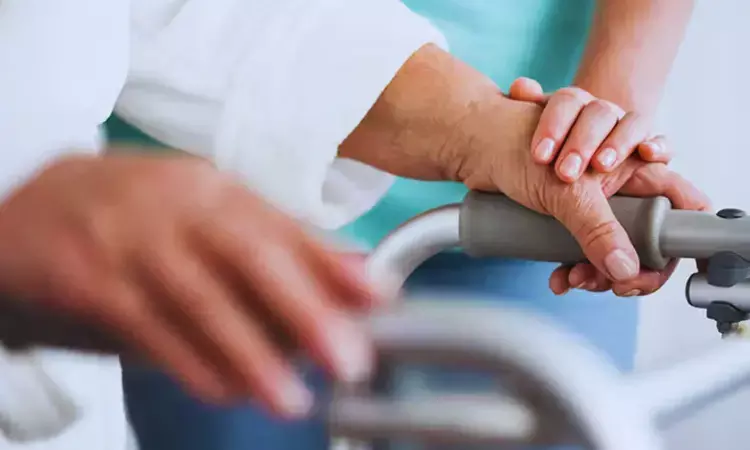- Home
- Medical news & Guidelines
- Anesthesiology
- Cardiology and CTVS
- Critical Care
- Dentistry
- Dermatology
- Diabetes and Endocrinology
- ENT
- Gastroenterology
- Medicine
- Nephrology
- Neurology
- Obstretics-Gynaecology
- Oncology
- Ophthalmology
- Orthopaedics
- Pediatrics-Neonatology
- Psychiatry
- Pulmonology
- Radiology
- Surgery
- Urology
- Laboratory Medicine
- Diet
- Nursing
- Paramedical
- Physiotherapy
- Health news
- Fact Check
- Bone Health Fact Check
- Brain Health Fact Check
- Cancer Related Fact Check
- Child Care Fact Check
- Dental and oral health fact check
- Diabetes and metabolic health fact check
- Diet and Nutrition Fact Check
- Eye and ENT Care Fact Check
- Fitness fact check
- Gut health fact check
- Heart health fact check
- Kidney health fact check
- Medical education fact check
- Men's health fact check
- Respiratory fact check
- Skin and hair care fact check
- Vaccine and Immunization fact check
- Women's health fact check
- AYUSH
- State News
- Andaman and Nicobar Islands
- Andhra Pradesh
- Arunachal Pradesh
- Assam
- Bihar
- Chandigarh
- Chattisgarh
- Dadra and Nagar Haveli
- Daman and Diu
- Delhi
- Goa
- Gujarat
- Haryana
- Himachal Pradesh
- Jammu & Kashmir
- Jharkhand
- Karnataka
- Kerala
- Ladakh
- Lakshadweep
- Madhya Pradesh
- Maharashtra
- Manipur
- Meghalaya
- Mizoram
- Nagaland
- Odisha
- Puducherry
- Punjab
- Rajasthan
- Sikkim
- Tamil Nadu
- Telangana
- Tripura
- Uttar Pradesh
- Uttrakhand
- West Bengal
- Medical Education
- Industry
Choline Intake Boosts Bone Density in Postmenopausal Women, reveals research

A new study published in Scientific Reports has found that higher dietary choline consumption is linked to greater bone mineral density (BMD) in postmenopausal women, a group highly vulnerable to osteoporosis. Since the accelerated bone loss caused by estrogen deficiency during menopause, identification of modifiable dietary factors such as choline is important for establishing osteoporosis prevention strategies. The study was conducted by Jincheng and colleagues.
The study involved 4,160 postmenopausal women aged 50 years and above with no exclusion based on income or ethnicity. The information was captured in six cycles of the NHANES from 2007 through 2018. Researchers used weighted linear regression models to test how cumulative dietary choline consumption was associated with lumbar spine bone mineral density. The models were completely adjusted for suspected confounders, such as age, race, income level, body mass index (BMI), and comorbidities. Stratified analyses were performed to determine whether socioeconomic and demographic characteristics altered the detected effects.
Key Findings
• With every 1 g/day higher choline intake, there was a 0.082 g/cm² rise in lumbar spine BMD (β: 0.082, 95% CI: 0.025–0.139).
• Participants in the highest quartile of choline consumption (Q4) also had a 0.025 g/cm² greater BMD than those in the lowest quartile (Q1) (β: 0.025, 95% CI: 0.007–0.042).
The association was significantly larger in some subgroups:
• Obese women had a greater effect size of 0.146 g/cm² (95% CI: 0.067–0.220, P interaction = 0.015).
• High-income women (PIR > 4) experienced a rise in BMD of 0.121 g/cm² (95% CI: 0.013–0.228, P interaction = 0.003).
• Non-Hispanic White women had a BMD increase of 0.110 g/cm² (95% CI: 0.034–0.185, P interaction = 0.039).
This research yields the first holistic evidence that increased dietary choline is positively associated with higher lumbar spine BMD in postmenopausal women, especially in obese women, high-income populations, and non-Hispanic Whites. These results indicate the promise of choline-focused nutritional interventions for the prevention of osteoporosis in this at-risk population. The role of income and race also highlights the importance of equitable diet interventions able to reach the bone health disparity among aging women.
Reference:
Bai, J., Lv, P., Li, L. et al. Association between total dietary choline intake and lumbar spine bone mineral density in postmenopausal women based on NHANES 2007–2018. Sci Rep 15, 23483 (2025).https://doi.org/10.1038/s41598-025-08891-6
Dr Riya Dave has completed dentistry from Gujarat University in 2022. She is a dentist and accomplished medical and scientific writer known for her commitment to bridging the gap between clinical expertise and accessible healthcare information. She has been actively involved in writing blogs related to health and wellness.
Dr Kamal Kant Kohli-MBBS, DTCD- a chest specialist with more than 30 years of practice and a flair for writing clinical articles, Dr Kamal Kant Kohli joined Medical Dialogues as a Chief Editor of Medical News. Besides writing articles, as an editor, he proofreads and verifies all the medical content published on Medical Dialogues including those coming from journals, studies,medical conferences,guidelines etc. Email: drkohli@medicaldialogues.in. Contact no. 011-43720751


